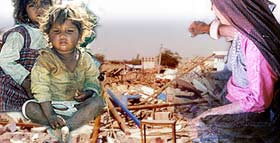The Rediff Special/ Josy Joseph


Most people believe the January 26 earthquake was a great social leveller -- it brought down both posh apartments and shanties; both the rich and the poor died or were devastated. It did not spare the mightiest businessman in Ahmedabad, even as it destroyed the poorest or the poor in the last village bordering the Rann of Kutch.
Yet, even in the midst of such despair, discrimination is rampant. The girl child, in particular, seems to have been discarded in the debris. Those who have survived are now busy with chores -- among other things, they fetch water from distant areas -- even as the boys continue to be waited on. The discrimination is more pronounced in the villages, where a girl is considered a burden and a boy, an asset.
"I would not have been so sad if my daughter had died. My son was my hope," said Kamala Devi, who is in her late 40s. She is a resident of Ratnawal, a prosperous village that specialises in the transport business. She sat wailing near the body of her 12-year-old son, Akash, who had slept in on January 26 while his sisters were helping their mother with the daily chores. They survived, he was crushed to death under the debris. Kamala Devi says her son would have been the breadwinner when he grew up. "He would have taken over the transport business from his father."
Ratnawal's 65-year-old village pradhan Ruda Karsan lost his 30-year-old married daughter and his sister, who was over 50. "Luckily," he says, "my five sons survived." He owns a fleet of trucks, a business he manages with the active assistance of his sons.
Karsan now lives in an open space close to the highway, where he has erected a temporary tent. He has stored some of his household items, pulled out of the debris, in one of his trucks. "We see sons as our support. Daughters are looked up on as a burden. They are to be brought up with so much care and then married off. Marriages here are very expensive affairs."
Several voluntary workers who toured the district add, "The people are not mourning the death of a girl as much as that of a boy."
At Rampur, a village of over 500 homes now reduced to rubble, the women sit around the dying embers talking about their sons. "We lost so many of them. Our village is cursed," says an old lady. She says, after their husbands, their sons would have been their "pillar of support."
The scene is not quite different elsewhere. In Mora Cheri village, which lost over one-tenth of its 3,000-strong population, women sit around talking about their dead. "Our sons would have looked after us when we were old," says one. She covers her head and face with her pallu, as the village prepares for yet another mass funeral. Amidst the debris are numerous Mora Cheri residents -- dead, decaying, waiting for the bulldozers to move in. Those alive know who lies where, but they are helpless.
In Choppa Dura village, of about 12,000 people, at least 50 have died. All of them have been given their final adieu in mass funerals. The village sleeps in the open and eats in community kitchens. Their sadness over the death of their sons overshadows the death of several female children.
Mohammed Salim, 35, has lost all three of his children. "If my sons would have grown up," he says, "they would have looked after us in our old age. My daughter would have gone away to some other house after her marriage." Salim's only daughter died along with around 100 of her classmates. They were participating in a Republic Day parade in the main market of Bachchau, a ghost town which seems to discriminate against girl children and poor even in its destruction.
Over 60 girl students of the town’s school, participants in the ill-fated Republic Day parade, were buried in a mass funeral by a few RSS volunteers. No parent returned to claim their daughter, no brother came looking for his sister.
Design: Dominic Xavier
The Complete Coverage | List of earthquake sites
Back to top